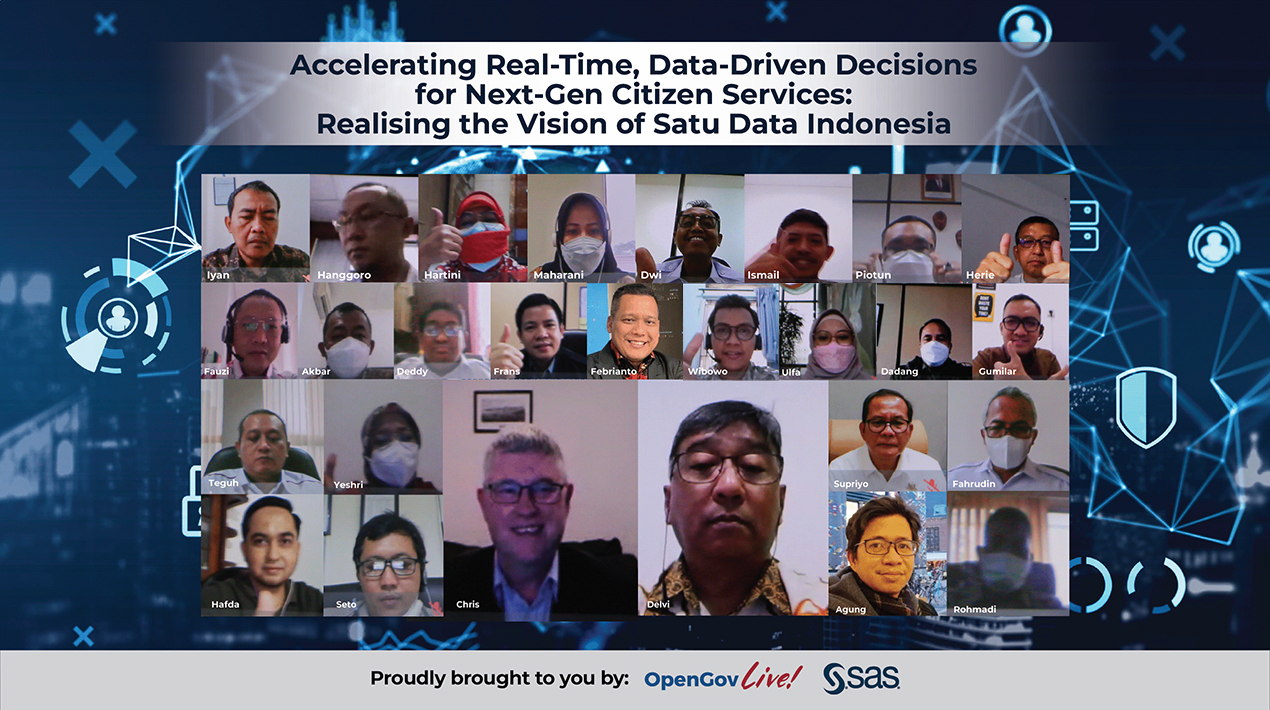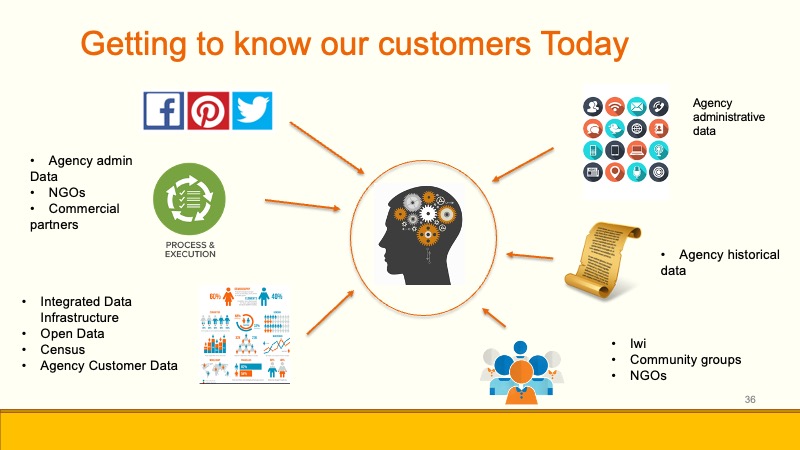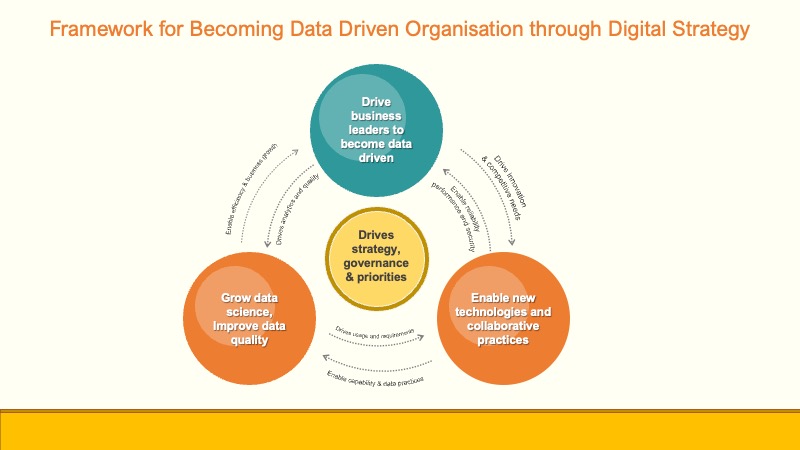
Government agencies and enterprises are in an unprecedented time, going through the largest digital transformation in history. The pandemic has vaulted the government headfirst into the next stage of digital transformation – catalysed by the need for online delivery and powered by a huge surge in data. Indeed, there is a good case to be made that digital transformation is likely to fall short unless it is based on a solid foundation of “data transformation.”
To become a truly data-driven organisation that operates in real-time, agencies are undertaking multiple modernisation initiatives, including advanced analytics, artificial intelligence, machine learning, .cloud and data management.
Government agencies are beginning to take a deeper look at capturing data about streaming events. Being able to act as soon as events occur improves operational responsiveness and organisational effectiveness. The challenge is moving beyond the limited value that static data assessment provides.
Through strengthening data management, agencies can improve integration in the planning, implementation and evaluation of development policies. All stakeholders believe that implementing e-government (SPBE) will be key to efficient, high-quality, transparent and accountable public services by making use of efficiently integrated data from both central and regional governments.
The Government of Indonesia is taking the right steps in the direction of utilising data to serve its citizens better. Satu Data Indonesia has been established by President Joko Widodo through Presidential Regulation Number 39 of 2019 – the legal foundation for creating accurate, up-to-date, integrated and accountable data.
Satu Data Indonesia is the answer to proper data management, including supporting various urgent government programs such as handling the pandemic, providing social assistance, and digital transformation.
Satu Data Indonesia also plays a strategic role in efforts to develop the digital sector and optimise productive efforts for the advancement of the nation. Therefore, accelerating the implementation of one data policy is the key to the success of digital transformation and supporting the government in resolving strategic issues.
This points to several questions:
- Are the agencies well equipped to manage, process and analyse the volume of data at hand?
- Do the agencies have the technologies to make sure data is standardised and interoperable?
- Are agencies able to uncover insights from those events and make real-time intelligent decisions?
- Can agencies utilise insights to define, test and refine projects?
Government missions are no longer static, but continuously in motion, handling the “now.” To be effective, agencies need to continually innovate to provide seamless and easy-to-use services and improve the resilience and security of digital platforms for citizens, businesses and public officers.
Agencies need a complete streaming data platform that treats data in motion, whether it is driving action or producing real-time analysis. And this platform must be capable of supporting workloads anywhere, anytime across the nation, whether it is in the cloud, on-prem or at the edge and connect them all.
The OpenGovLive! Virtual Breakfast Insight held on 21 April 2022 was aimed at imparting knowledge on how public sector agencies can power mission outcomes, better serve citizens, enhance IT efficiency and maximise productivity with a platform built for data in motion.
Turning government policy into practice

Kicking off the session, Mohit Sagar, Group Managing Director & Editor-in-Chief acknowledges that the pandemic has brought significant changes in culture and perspective. Data is needed everywhere, Mohit asserts, but ‘data is only an asset if you can use it.” He adds that, like oil, data needs to be refined – accurate, accessible, clean and trustworthy.
In Singapore, Singpass allows access to over 2,000 services from over 700 government agencies and businesses and more than 29,000,000 transactions are made per month. Businesses and agencies can tap on Singpass’ application programming interfaces (APIs) to enable access or create new value-added services for Singapore residents.
A single source of truth is critical, Mohit believes. Data is only valuable when institutions have a holistic view of data. “Are organisations able to manage, process and analyse the volume of data at hand? Is the Data standardised and interoperable? Can we make real-time intelligent decisions?”
Size, however, is not a barrier to the adoption of data, Mohit claims, as he shares the example of India’s application of centralised data.
There are several issues at hand. Firstly data has a shelf-life – not all data is valuable for eternity. Secondly, citizens are becoming more demanding and want service any time, anywhere and on any device. Organisations and government services need to adopt technology to keep up with rising expectations. Fundamentally, Satu Data will take time to happen.
Closing his address, Mohit strongly recommends organisations look for specialists to partner with. “Let the experts do what they do best,” Mohit urges. “It not only allows the best systems and infrastructure to be put in place but also frees up organisations to focus on their core.”
Harnessing technology in centralising data

Delvi Eka Putra, Principal Pre-Sales Solutions Architect, SAS Indonesia spoke next about how Data Management and Advanced Analytics can help with mitigating the challenges of realising Satu Data.
He began by elaborating on the challenges of the Satu Data initiative. Firstly, there are diverse sources of data – central government, state institutions, ministries/non-ministries -across a widespread area, consisting of provinces and cities:
- Various applications
- Multiple storages
- Various Formats
- Data Duplication
- Data Provision
- Data Quality & Validity
- Data Security
Those are the areas that SAS is able to provide help in, Delvi further explained. SAS has expertise in data management with AI/ML & in-memory processing that can accelerate the processing of large amounts of data. Some ways SAS is able to provide assistance include:
- Access to multiple sources on the server/cloud in batches/ streaming
- Data Integration
- Data Standardisation, QKB
- Profile and Metadata Management.
- Quality & Integrity
- Master Data Management
- Governance
SAS Advanced Analytics aids business improvements because it helps with forecast and optimisation, visual investigation, decision management, ML/AI/DL/Statistic and Computer Vision. Delvi shared about the use case of SAS® Data Management and SAS® Advanced Analytics in Government Institutions
- Finance
- Automation, predictive modelling, text mining, network link analysis to detect fraud in state revenues and expenditures
- Analysis of past data and other factors to improve the accuracy of budget management
- Health and Social Welfare
- Data Management and Analytics accelerate vaccine and drug research
- Contact Tracing to accelerate the tracking of people with infectious diseases
- Forecasting optimises health facilities and personnel as well as pharmaceutical inventory
Civil Defense and Security
- Detection and investigation to solve crimes and terrorism, well as improving strategy, operations and tactics
- Predictive Maintenance to improve combat equipment readiness
- Workforce Analytics to improve quality, quantity, and personnel readiness
- Infrastructure and Smart City
- Analyse IoT sensors, weather data, and other data in real-time for monitoring, predicting, and optimising disaster prevention and management
- Artificial Intelligence/Machine Learning to improve services, health, public safety, more efficiently
In conclusion, Delvi believes that SAS can contribute to government agencies and health institutions in healthcare and education. SAS solutions and technologies have been implemented by governments in various countries and government agencies have benefited from SAS.
Transforming government through data

Chris Buxton, Chief Digital Officer, Statistics New Zealand spoke next about how to harness data-based insights to deliver citizen-centric services.
He began by emphasising that the commercial world is advertising every day on multiple platforms. They practise Next Best Action Marketing, which considers multiple different actions that could be taken for a customer and decides on the best one to provide. From a citizen perspective, this would mean thinking about what would be the next best decision that a government can make around expenditure to have the best outcome – this reduces dependence on the state and extends lifespans.
To do so, institutions need to:
- Predict their interests, values, and needs
- Personalise to each individual and context
- Deliver in moments of need
- Adapt to their changing situation
When understanding what data is available, it can be approached either from the demand or supply perspective. It indicates where data is at, what people are worried about, health and education information, social information and non-government data. Combine that in a centralised data warehouse and it is a powerful advantage.

The reason for this approach, Chris shares, was because the data quality was not conducive to data analytics. There are two ways to approach that:
Solve the data quality issue at the point of analytics, which means everyone must solve it each time they encounter it; or centralise it and resolve it at once
Chris shared his own experience of Integrated Data at Statistics New Zealand. There is a difference between Integrated Data Infrastructure (IDI) and Longitudinal Business Database (LBD).
IDI: An integrated database containing de-identified longitudinal microdata about people and households.
LBD: An integrated database containing de-identified longitudinal microdata about businesses
Statistics New Zealand’s IDI is a large research database containing de-identified microdata about people and households. The IDI contains person-centric microdata from a range of government agencies, whereas LBD complements the IDI with microdata about businesses.
It happens over time, Chris shares; over the years they have acquired more data and are highly exacting about the quality of data that enters the centralised data warehouse – he believes that data needs to have longitudinal data, or it would be difficult to measure the impact of the activity.

Statistics New Zealand has been able to build up a rich picture of the activity of their country and pick out trends.
Accordingly, he shares the two use cases of how Stats NZ have applied data analytics:
Better targeting services to vulnerable children: By looking at data on factors that affect later-life outcomes for children, the insights are informing how policies are angled.
The Virtual Health Information Network: Data is also used to understand the impact of lifestyle on health
In conclusion, Chris suggests that institutions should not try to do everything in one go but understand that it is a relationship between various aspects that institutions need to pay attention to. In terms of recommendations, he suggests starting small, being prepared for surprises, measuring well, getting management on board and focusing on customers.
“Putting the citizen at the heart of everything that the organisation does,” is something that organisations should not lose sight of.
Interactive Discussions
After the informative presentations, delegates participated in interactive discussions facilitated by polling questions. This activity is designed to provide live-audience interaction, promote engagement, hear real-life experiences, and facilitate discussions that impart professional learning and development for participants.
The first poll asked delegates if they thought it is important to have Satu Data repository as a single source of truth. An overwhelming majority (79%) felt that it is very important (79%) while 21% believe it to be important.
On being asked about the initiatives that their organisation have taken to ensure the quality of their advanced data analytics, over a third (38%) indicated that they have implemented data management tools to ensure data quality, governance and lineage. The remaining delegates indicated that they have implemented data warehouse/data lake/big data initiatives (30%), are looking for the right solutions (19%) or have an in-house team of skilled data scientists (13%).
In response to the results, Delvi believes that with a data warehouse, organisations can make quicker decisions and serve the public better. Security is also important in ensuring that there is data protection for the public. He also added that having high-quality data is critical for all organisations.
Mohit added that India has demonstrated that size is not an issue.
For Chris, building skills without a data warehouse would be difficult as people need to have the foundational capability and context that will help them to learn.
On their organisation’s biggest challenge in the application of advanced data analytics, almost half (40%) found the lack of skilled staff a major challenge. Other delegates are challenged by the inability to synchronise disparate data sources (26%), the inability to derive meaningful insights through data analytics (20%), the inability to get voluminous data onto a big data platform (7%) and the lack of quality data and proper data storage (7%).
A delegate shared that his organisation manages a lot of data from another ministry and there are many kinds of data that are missing.
To that, Mohit remarked that the sharing of data and the accessibility of data is an issue that prohibits a central source of truth.
Another participant opined that “mindset is the most important.” Currently, there is no perception and appreciation of how important centralised data is. He echoed the point made by Chris about the need to get management to see the importance of data.
Mohit added that providing them with information will make them realise that “it is not about today, but tomorrow”.
In response to the results, Chris remarked that the skills gap is fundamental and pressing all over the world – few people understand the full data management life cycle.
The next question asked delegates about the data analytics use case that is frequently asked by business users or top management in their organisation. Most of the delegates (67%) found the use case of having a single view of unified information from all lines of businesses the top question. The rest of the delegates found the use cases of financial performance analytics (8%), forecasting business performance (7%) and other unstated use cases (17%) the most sought after.
A delegate remarked that “data is not the end product – knowledge is the end product”.
Mohit concurred, “It is the insights to make informed decisions that are valuable.”
The final poll asked the delegates the criterion for considering advanced analytics as a success in their organisation. Most of the delegates (42%) believe that data accuracy and the ability to drill up to every detail is the benchmark of success. Other delegates opted for being able to get analytics reports promptly (33%), effective dashboard reporting (17%) and real-time updates (8%) as the benchmarks of success.
A delegate expressed that mining precise data and representing the function or information that organisations need is the first step. For him, accuracy is the biggest problem – there are too many data sources, he claims.
For Chris, the criterion for success depends on perspective. Senior executives might measure success through effective dashboard reports. Data scientists might consider the state where users can do analytics without IT’s help as successful. For people who want to make decisions, data accuracy would be the choice.
After the interactive discussion, the session segued into a demonstration by Wibowo Leksono, Senior Customer Advisory, SAS Indonesia, who did a demonstrated how SAS’ software can be used to generate actionable insights.
Closing
Febrianto Siboro, Managing Director, SAS Indonesia closed the session by thanking everyone for their enthusiastic participation.
He recognised that there are many concerns with Satu Data, but he shared that SAS would be able to help organisations build a quality database and equip organisations with data processing technology, data control and sovereignty to provide better citizen experiences.
He encouraged delegates to keep the conversation alive and to reach out to him if there are questions they might have.
















